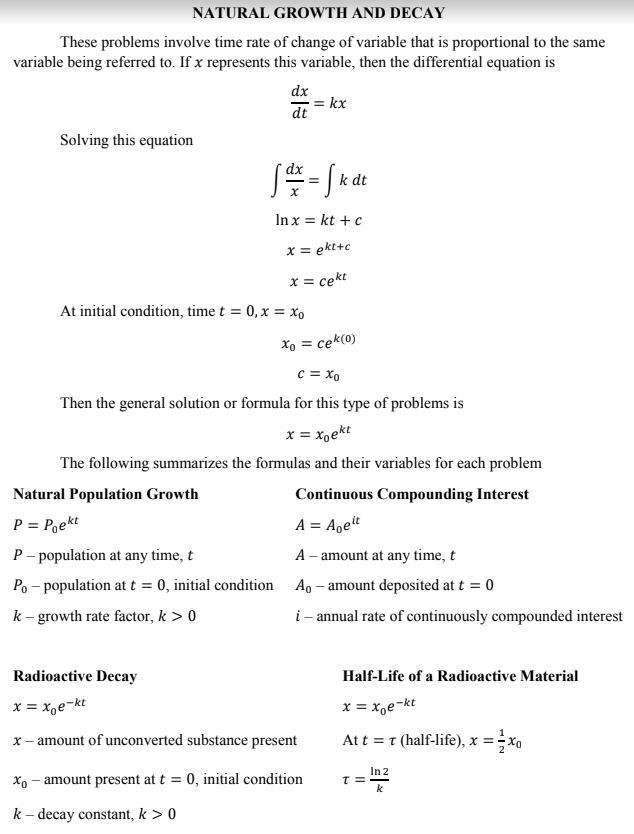2. Initially, there are 500 strands of bacteria in a culture. If the growth rate of the population of the bacteria in the culture is proportional to the population itself, the strands of the bacteria after 5 minutes are 750 strands. Determine the growth rate factor of the population growth and determine when will there be 1500 strands of the bacteria in the culture.
2. Initially, there are 500 strands of bacteria in a culture. If the growth rate of the population of the bacteria in the culture is proportional to the population itself, the strands of the bacteria after 5 minutes are 750 strands. Determine the growth rate factor of the population growth and determine when will there be 1500 strands of the bacteria in the culture.
Calculus: Early Transcendentals
8th Edition
ISBN:9781285741550
Author:James Stewart
Publisher:James Stewart
Chapter1: Functions And Models
Section: Chapter Questions
Problem 1RCC: (a) What is a function? What are its domain and range? (b) What is the graph of a function? (c) How...
Related questions
Question

Transcribed Image Text:NATURAL GROWTH AND DECAY
These problems involve time rate of change of variable that is proportional to the same
variable being referred to. If x represents this variable, then the differential equation is
dx
= kx
dt
Solving this equation
dx
k dt
In x = kt + c
x = ekt+c
x = cekt
At initial condition, time t = 0, x = xo
Xo = cek(0)
c = Xo
Then the general solution or formula for this type of problems is
x = x,ekt
The following summarizes the formulas and their variables for each problem
Natural Population Growth
Continuous Compounding Interest
P = Poekt
A = Aoet
P – population at any time, t
A – amount at any time, t
Po – population at t = 0, initial condition Ao – amount deposited at t = 0
k – growth rate factor, k > 0
i- annual rate of continuously compounded interest
Radioactive Decay
Half-Life of a Radioactive Material
x = x,e-kt
x = x,e-kt
x – amount of unconverted substance present
Att = 1 (half-life), x =÷xo
0, initial condition
In 2
T=-
k
Xo - amount present at t =
k – decay constant, k > 0

Transcribed Image Text:2. Initially, there are 500 strands of bacteria in a culture. If the growth rate of the population
of the bacteria in the culture is proportional to the population itself, the strands of the bacteria after
5 minutes are 750 strands. Determine the growth rate factor of the population growth and determine
when will there be 1500 strands of the bacteria in the culture.
Expert Solution
This question has been solved!
Explore an expertly crafted, step-by-step solution for a thorough understanding of key concepts.
Step by step
Solved in 3 steps with 3 images

Recommended textbooks for you

Calculus: Early Transcendentals
Calculus
ISBN:
9781285741550
Author:
James Stewart
Publisher:
Cengage Learning

Thomas' Calculus (14th Edition)
Calculus
ISBN:
9780134438986
Author:
Joel R. Hass, Christopher E. Heil, Maurice D. Weir
Publisher:
PEARSON

Calculus: Early Transcendentals (3rd Edition)
Calculus
ISBN:
9780134763644
Author:
William L. Briggs, Lyle Cochran, Bernard Gillett, Eric Schulz
Publisher:
PEARSON

Calculus: Early Transcendentals
Calculus
ISBN:
9781285741550
Author:
James Stewart
Publisher:
Cengage Learning

Thomas' Calculus (14th Edition)
Calculus
ISBN:
9780134438986
Author:
Joel R. Hass, Christopher E. Heil, Maurice D. Weir
Publisher:
PEARSON

Calculus: Early Transcendentals (3rd Edition)
Calculus
ISBN:
9780134763644
Author:
William L. Briggs, Lyle Cochran, Bernard Gillett, Eric Schulz
Publisher:
PEARSON

Calculus: Early Transcendentals
Calculus
ISBN:
9781319050740
Author:
Jon Rogawski, Colin Adams, Robert Franzosa
Publisher:
W. H. Freeman


Calculus: Early Transcendental Functions
Calculus
ISBN:
9781337552516
Author:
Ron Larson, Bruce H. Edwards
Publisher:
Cengage Learning